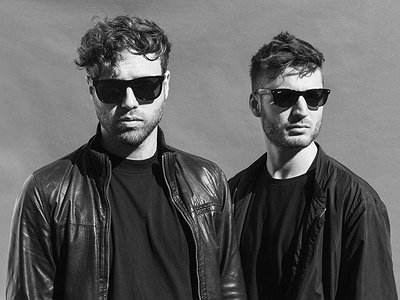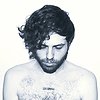Could you take us through a day in your life, from a possible morning routine through to your work? Do you have a fixed schedule? How do music and other aspects of your life feed back into each other - do you separate them or instead try to make them blend seamlessly?
I am kind of a grandpa these days with going to bed sometime around 11pm and up at 7 or 8am. I used to be a bit of a party animal touring, but since settling down I definitely prefer to be a early morning bird. Wake up, coffee and breakfast. Gym 3-4 days a week. I can't express how important it is for gym and fitness to be in a creative mind's daily routine. It's crucial. It not only lets you sort of reset your mind and stop thinking about music for a bit; but it allows you to get out of your head and get into your body and get the blood moving away from the studio. It also allows you to release the much needed chemicals in the brain that get eaten up with emotions you are using in your musical expressions each day. I am a firm believer in this. I have a pretty fixed schedule. Sometimes too much work and at times doesn’t seem like enough (I like to keep very busy). But music is always there and with me every step of the way. It's hard to separate something that is part of you after all.
Could you describe your creative process on the basis of a piece or album that's particularly dear to you, please? Where did the ideas come from, how were they transformed in your mind, what did you start with and how do you refine these beginnings into the finished work of art?
That is such a long winded answer and has developed and evolved constantly. How I approach a piece changes entirely with the project or place I am at in life I think. This latest album “A Beautiful Curse” was my ultimate so far. I did the entire thing myself (write, record, produce, mix and master) and it sort of combined everything I have done in my 15+ years of music industry from both a creative front and technical front (along with execution). I stepped outside of my comfort zone in almost every way and dialed in on details I never would have before. I also took my time. A lot of time. Took about 2 years from start to finish. Not because of the amount of effort but because I wanted to give it time and focus and write then do my other work for my clients etc, then back to the album when the feelings were there and needing to be expressed. It allowed for a massive self-discovery process and one that taught me lots of patience and trusting of myself. Honestly; I found out more about myself through this album than anything I have ever done. I think the fans or listeners can hear that in the work, and that is one of the best ways to communicate and relate to others that may be having the same experiences that I had or needing to experience something like it.
There are many descriptions of the ideal state of mind for being creative. What is it like for you? What supports this ideal state of mind and what are distractions? Are there strategies to enter into this state more easily?
I feel like the inspiration is key to step into this state of mind, then once it is rolling it starts to react on its own. It's a very strange thing but at the start of a song you are telling it what to do … what kick drum … what synth … then something happens. It somehow switches at one pivotal moment and suddenly the music is telling you what to do. It starts to be a reflection of what is needing to be done to take it there. Its like it comes full circle with you and your creation, and becomes one entirety. Its actually quite creepy when I just said this out loud. It's definitely something beyond our explanation or understanding, to be honest.
How is playing live and writing music in the studio connected? What do you achieve and draw from each experience personally? How do you see the relationship between improvisation and composition in this regard?
I am a firm believer that what you get laid down on an album should be that much bigger live. There is nothing worse than going to a show of an artist you got the album and love it and it's just … hearing the album again on a big PA. It's about performance. It's about being powerful sonically. I want people to walk away going “holy f*ck” and then go back home and listen to the album to remind them how brilliant the show, but also how much more detailed or decisive the studio recording is. They (the recordings and the live show) each should have their own life force at the end and stand on their own.
How do you see the relationship between the 'sound' aspects of music and the 'composition' aspects? How do you work with sound and timbre to meet certain production ideas and in which way can certain sounds already take on compositional qualities?
Sometimes sounds will just work but you have to keep in mind how it will relate to other sounds around it. This becomes the “sound design” portion and will be the essence of the songs ‘vibe’. The composition is the storyline and how to make this vibe become a story or paint the picture. Onward into the realm of delivery and how you want to carry your emotions or expressions, you can use the sound design to reflect that and the composition to carry that. Every good story needs some dramatic turning points; and I feel music is no different. The sad thing with much of pop music these days is they have completely lost this and it has become nothing more than a forgotten tune some few weeks later. It's throw away like much of our society. It's hard to find the gems that will be timeless and still around … reason why? It is neglecting the story and dramatic inflections. It is neglecting the carrying of emotions through out a storyline musically speaking. This is important for humans to relate for longer than a quick winded pop-n-stop hit.
Our sense of hearing shares intriguing connections to other senses. From your experience, what are some of the most inspiring overlaps between different senses - and what do they tell us about the way our senses work? What happens to sound at its outermost borders?
Colors and taste and all our senses are definitely intertwined. For instance, if you were to take the brain out from the body from both a chef and a musician, the actual synapses firing and way the brain is working is nearly the same with the main difference only being the senses they end up using to ‘digest’ it. You write a recipe or you write a song you are making ingredients for an artful execution to other humans to enjoy (or hate). A song can be simple and manufactured, just as food can be. It can sound cheap or taste cheap. It can also be something you've never experienced before and be truly a memorable experience. This also applies to all other forms of art or culture. It's all about how it is received and how it is applied in terms of physics in our real world.
Art can be a purpose in its own right, but it can also directly feed back into everyday life, take on a social and political role and lead to more engagement. Can you describe your approach to art and being an artist?
I am a big supporter of using art to not only express myself but also express myself for others to relate to. We are all human after all and all more similar than we like to tell ourselves. I have been through hell and back and I want to express this to others to relate and find the hope or glimpse of relation to what I have endured. At the same time that art is therapy for the creator it is also for the person that winds up seeing, hearing, using or feeling it. It touches them. It is an exchange of ideas or feelings on a level of reciprocation that make human beings truly unique. We can use it for good or bad. I prefer to use it to better the world and those that experience it or at least relate in some different way. Art is so very powerful and I think a lot of society take this for granted while lots of those with power use it for abuse. Some people just wander aimlessly being controlled by the bad side of it all. Art is in everything and once we realize that and use it for good we can maybe make the world a better place.
It is remarkable, in a way, that we have arrived in the 21st century with the basic concept of music still intact. Do you have a vision of music, an idea of what music could be beyond its current form?
I think it is seeing a major divide. Those that care about the actual art of it all and those that care about the entire monetary or business side of it all. You can blend the gaps of course. That's music business after all. But the divide is getting bigger and further apart. I hope that people will start to be able to see the art value in it again. But the more throwaway culture we have in every day life, we also will have in art and music and the cultures. No more black or white or red or blue … just grey. Lots and lots of grey. Let's just hope this doesn’t get to the point that no one cares; including the artists. As I mentioned it is crucial to our survival and momentum as a species to relate on an emotional front and if we take that away too much, then we have completely lost that line of communication that is unique to human beings. We then have lost something that is truly a powerful and magical thing. It will become a forgotten and dead language.



